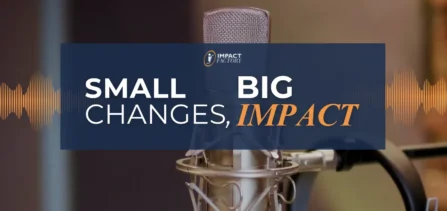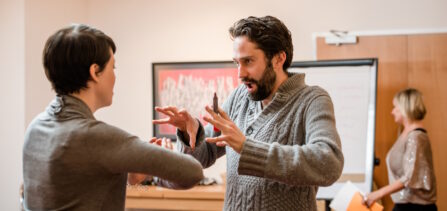
Storytelling – Finding Common Ground
It takes very little to create common ground and we know that storytelling is one of the best ways to achieve that.
Can You Use Storytelling for Finding Common Ground
My father was an actor, director and a car salesman – professions that are really quite compatible.
When I was young he used to go on and on about the importance of finding common ground whenever dealing with other people. He felt it was the key to his successful sales career and to the way he worked to reach an audience, whether on stage or behind the scenes.
That message went in deep and made a big impression on me and has informed a lot of my own work over the years.
Finding Common Ground Through Storytelling
We were having quite a lively discussion about Storytelling recently here at Impact Factory and I made the point that great storytelling serves the function of finding common ground between the storyteller and the story-receiver. Since common ground is how we relate to other human beings, businesses that consciously work to find that common ground have a far better chance of attracting and retaining clients and customers. What are the best ways to create common ground using storytelling?
It takes very little to create common ground and we know that storytelling is one of the best ways to achieve that.
Story Example
I was reading recently about how it takes London black-cab drivers three and a half years to learn The Knowledge – the test that means a student knows the ins and outs of every nook and cranny, twisted street and hidden mews in London. There are no short-cuts; it takes that long to learn.
In two sentences I’ve set a scene and created a word picture that most readers will (I hope) respond to. I’ve started building my common ground.
Finding Common Ground
Here’s the next step
Impact Factory doesn’t hire training deliverers; we develop our own. Like the London cabbie, our prospective trainers have to attend our intensive internal training programme for at least two years before they become an Accredited Impact Factory Training Consultant. We put them through the same rigorous paces as a London cabbie and although they may not know how to get from Charing Cross to Wembley arena in the quickest way possible, they are steeped in Impact Factory’s Knowledge, ethos and ways of working.
In two paragraphs you get a dynamic picture of what training to become an Impact Factory Training Consultant might be like. And I’ve also created common ground.
You the reader, and me the writer don’t need to have the exact same experience to stand on common ground together. I’ve used storytelling elements to engage you, pique your interest and give you insight. For instance, by creating a simplified word picture of London that becomes our shared experience and we can build the relationship from there.
Business Case for Storytelling
In terms of building a good business case for using storytelling, the ‘evidence’ is compelling.
People tend to make choices from an emotional perspective with a dash of logic, rather than the other way around. Indeed, you could even say that at times we make totally irrational choices in business, completely bypassing logic.
Facts and figures may be a tried and true way of communicating information and will attract some people (and another chunk will feel they ‘ought’ to respond positively). For the vast majority, however, finding common ground needs something more.
By incorporating storytelling elements in the majority of communications, both internal and
external, numerous associations are created that resonate both consciously and subconsciously within the recipient.
When I talk about storytelling elements, I’m not suggesting that every communication is all about ‘once upon a time’.
Using metaphors, analogies, colourful language, expansive adjectives and punchy adverbs are all ways to create an emotional climate and it is through that emotional climate that common ground is established. Using humour, mystery, heroes and villains, and repetition again are ways of drawing people into your business case.
Finding Common Ground Through Storytelling
By Jo Ellen Grzyb, Founding Partner of Impact Factory.
Check out Impact Factory’s
Storytelling for Business Courses
and






